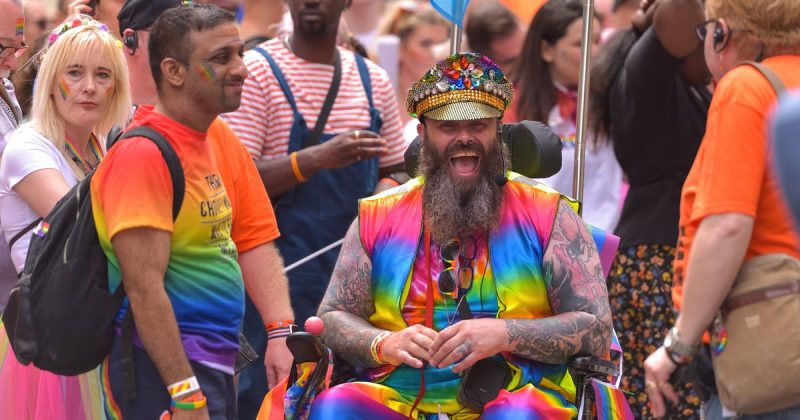Disabled LGBTQ+ Youth At Greater Risk Of Suicide Than Their Peers, Study Finds

A report released this week by a youth suicide prevention group found that young LGBTQ+ people who are disabled have higher rates of mental health issues and are at greater risk of suicide compared to their non-disabled peers.
The Trevor Project, a national suicide prevention nonprofit that serves LGBTQ+ youth, surveyed more than 28,500 LGBTQ+ people between the ages of 13 and 24 for its study, 7,780 of whom identified as having a disability. Results of the survey, released in a report on Friday, suggest that those who identified a disability faced a much higher risk of experiencing mental health issues and suicidal thoughts, exacerbated by discrimination over their disabilities.
“For youth who live at the intersection of LGBTQ identities and disability, their minority stress experiences are often compounded, likely contributing to these higher rates,” said Dr. Steven Hobaica, lead research scientist for the study, in an interview with HuffPost.
About 68% of the disabled LGBTQ+ youth surveyed said they felt they were discriminated against for their actual (or perceived) disabilities in 2023. Hobaica told HuffPost that systemic and individual discrimination, or “minority stress,” is frequently tied to higher rates of mental health symptoms, such as depression and anxiety, and suicidal tendencies among LGBTQ+ youth.
The study also found that 60% of disabled LGBTQ+ youth said they experienced depression in 2023, and 75% experienced anxiety. For their non-disabled peers, those figures were 51% and 63%, respectively. Rates of suicidal thoughts, suicide attempts and self-harm were also higher for those who identified as disabled: Forty-eight percent seriously considered suicide, and 19% attempted suicide.
The Trevor Project also found higher-than-average rates of mental health symptoms and suicidal tendencies in surveys with autistic and Deaf LGBTQ+ youth.
About 1 in 5 Gen Z people identify as LGBT, according to a 2021 Gallup survey. Another survey, conducted by the Human Rights Campaign in 2018, found that 15% of LGBTQ+ youth identify as disabled.
There is limited research on the mental health of LGBTQ+ youth in general, Hobaica said, and even less data on those who identify as disabled. He emphasized the importance of conducting intersectional research to “better understand and improve the lives of LGBTQ young people who hold multiple marginalized identities.”
“It’s crucial to recognize that LGBTQ people are not a monolith,” Hobaica said.
While the implications for mental health among LGBTQ+ youth are concerning to researchers, the report identified a light at the end of the tunnel: affirming mental health care.
According to the report, 68% of disabled LGBTQ+ youth reported feeling as though their therapist understood their disability. Of those who felt that connection with their therapist, only 16% attempted suicide last year, as opposed to 25% of those who didn’t feel their therapist understood them.
“Feeling seen, understood, and affirmed is powerful for all LGBTQ+ youth ― particularly those who live at the intersection of multiple marginalized identities — and is consistently related to more positive mental health outcomes,” Hobaica explained.
He went on: “It’s imperative that mental health professionals seek disability-related training in order to better understand the unique challenges that LGBTQ+ youth with disabilities face, and be equipped to provide quality care based on these factors.”
If you or someone you know needs help, call or text 988 or chat 988lifeline.org for mental health support. Additionally, you can find local mental health and crisis resources at dontcallthepolice.com. Outside of the U.S., please visit the International Association for Suicide Prevention.








